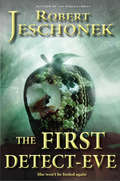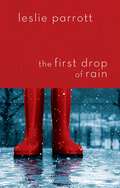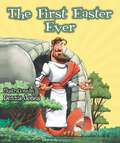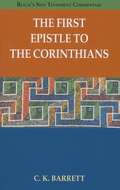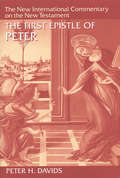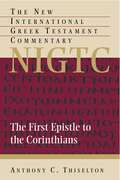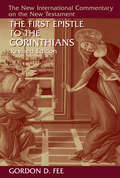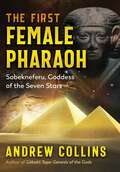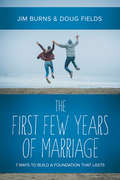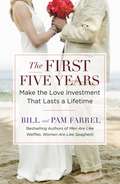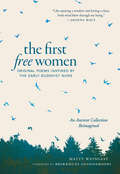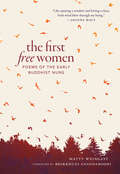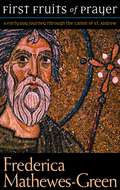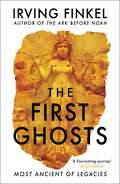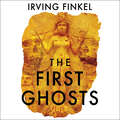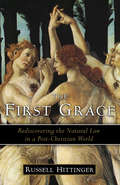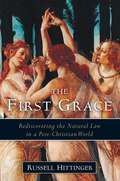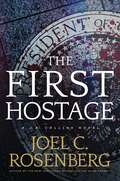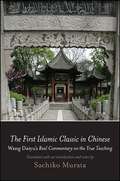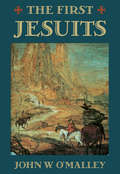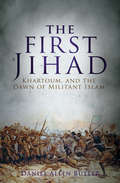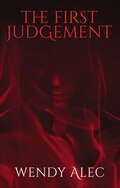- Table View
- List View
The First Detect-Eve
by Robert T. Jeschonek Ben BaldwinEve, the first woman in the world, wants one thing. To find who killed her son, Abel, and make them pay. Down on her luck since she got thrown out of Eden, Eve combs the darkest corners of a godless no man's land on the trail of a killer. Could her own flesh and blood hold the key? Or has her own worst enemy slithered back into her life to finish what he started in the Garden? When Eve becomes the first detective in history, she might end up dead before she can solve the first murder mystery of all time. And snakeskin might be the last thing that flashes before her eyes. Don't miss this exciting tale by award-winning storyteller Robert T. Jeschonek, a master of unique and unexpected fantasy and mystery tales that really pack a punch.
The First Drop of Rain
by Leslie ParrottHave you ever felt plucked out and suddenly dropped by the hand of God into the wasteland? Have you felt desolate, dry, and fragile? No sign of God, no sound of water?” Here is the personal and passionate, “Me too!” that fans of Leslie Parrott have been waiting for. For “Seattlite” Parrott, rain isn’t a date-canceling, mood-altering nuisance. Rather, that first drop of rain and the following drizzle or downpour is a persistent, positive, mystical fact of life that both confirms the presence of God and underscores his (seeming) absences. Through original poetry, vividly-drawn vignettes, and honest reflection, Parrott mixes images of rain and “wasteland” to explore the daily juxtaposition of deluge and desert we all encounter. A conversation about grief and death takes place in lush gardens teeming with life. A prayer, delivered and answered at a dying friend’s bedside, leads to bittersweet understanding. And personal confidences (“My flaws and fears are so real, they demand my full attention.”) strike a chord in all of us who struggle earnestly, if sometimes defiantly, to see God’s purpose in everything.
The First Easter Bunny: A children's story to discover Jesus through the eyes of one very special rabbit
by Allison SchuetzlerThe First Easter Bunny! A colorful array of watercolor illustrations with scripture references brings to life the unique story of Jesus arriving in Jerusalem on Palm Sunday to his ascension into the heavens; all through the eyes of one small rabbit named Arnebeth. Included inside is a photograph of a real Israeli rock rabbit known as a hyrax just like Arnebeth!
The First Easter Ever
by ZondervanThrough easy-to-understand text and vibrant and engaging artwork from The Read with Me Bible creator Dennis Jones, readers 4-8 can experience the timeless story of Jesus&’ ministry, death, and resurrection and God&’s amazing love through simple words and expressive pictures they clearly understand.A clear retelling of the Easter story, from the explaining Jesus&’s ministry to his time in the garden of Gethsemane, death on the cross, and his coming back to life, this paperback of The First Easter Ever is sure to be popular with young readers each holiday season.This picture book is perfect for:family reading during Holy Week or on Easter dayEaster gifts for grandchildren, nieces and nephews, or any boy or girl on your listSunday school and homeschool useAnd if you enjoy The First Easter Ever, check out The First Christmas Ever by Dennis Jones as well!
The First Epistle To The Corinthians
by C. K. BarrettBlacks New Testament Commentary series has been hailed by both scholars and pastors for its insightful interpretations and reliable commentary. Each book in the series includes an insightful introduction to the important historical, literary, and theological issues; key terms and phrases from the translation highlighted in the commentary where they are discussed; explanations of special Greek or foreign terms; references to important primary and secondary literature; and a Scripture index. Perhaps more than any other Pauline letter, 1 Corinthians is known for affording insight into the nature and world of the earliest Christian communities. C. K. Barrett makes the text come alive both in its original setting and in the life of the church today. Barrett's arguments will challenge even the most seasoned scholars to rethink their interpretation of the many controversial passages.
The First Epistle of Peter (New International Commentary on the New Testament (NICNT))
by Peter H. DavidsThe First Epistle of Peter constitutes an important work of New Testament theology and pastoral care, serves as an example of how the early church applied Jesus&’ sayings and the Old Testament writings to contemporary concerns, and presents some extremely useful perspectives on living the Christian life today. This commentary by Peter Davids does an excellent job of mining the rich wealth of instruction to be found in this very significant section of Scripture. Davids&’s commentary contains several notable features: a unique grasp of 1 Peter&’s structure, a systematically arranged introduction that summarizes the commentary proper, a perceptive excursus on suffering in 1 Peter and the New Testament, Davids&’s own study translation, thorough and incisive comments on each verse of the test, frequent parallels to ancient literature, an exceptionally clear and lively writing style, and one of the most comprehensive bibliographies on 1 Peter available anywhere.
The First Epistle to the Corinthians (The New International Greek Testament Commentary)
by Anthony C. ThiseltonThis superb volume in the New International Greek Testament Commentary series provides the most detailed, definitive, and distinctive commentary on 1 Corinthians available in English to date. One of the world's most respected Christian theologians, Anthony Thiselton here provides in-depth discussion of the language of 1 Corinthians, presents his own careful translation of the Greek, traces the main issues of interpretation from the church fathers to the present, and highlights topics of theological, ethical, and sociohistorical interest today, including ethics and "rights," marriage, divorce and remarriage, "headship," gender, prophecy, and many others. No other commentary on 1 Corinthians embodies the wealth and depth of detail presented in Thiselton's work, which takes account of nearly all scholarly research on 1 Corinthians and incorporates substantial bibliographies throughout. In his commentary Thiselton indeed addresses virtually every question that thoughtful, serious readers -- scholars, students, pastors, teachers -- may wish to ask of or about the text of 1 Corinthians. His work truly offers a fresh, comprehensive, and original contribution to our understanding of this major epistle and its contemporary relevance.
The First Epistle to the Corinthians, Revised Edition (The New International Commentary on the New Testament)
by Gordon D. FeeThis landmark commentary, originally published in 1987, has been lauded as the best study available of Paul's theologically rich first letter to the Corinthians. Writing primarily for pastors, teachers, and students, Gordon Fee offers a readable exposition of 1 Corinthians that clearly describes the meaning of Paul's ideas and their larger theological relevance.Fee's revised edition is based on the improved, updated (2011) edition of the NIV, and it takes into account the considerable scholarship on 1 Corinthians over the past twenty-five years. Fee has also eliminated "chapter and verse" language -- totally foreign to Paul's first-century letter -- relegating the necessary numbers for "finding things" to parentheses.
The First Female Pharaoh: Sobekneferu, Goddess of the Seven Stars
by Andrew CollinsThe cult, magic, reign, and resurrection of the first female ruler in Egypt• Reveals the achievements of Sobekneferu, the political and religious issues of her age, the temples and ruins associated with her, and her continuing impact on ancient Egypt after her reign• Discusses Sobekneferu&’s magical beliefs and practices centered on the crocodile god Sobek, the hippo goddess Neith, and their representation as constellations• Examines the modern-day resurrection of Sobekneferu among mystics and occultists of Victorian London, including her role in Bram Stoker&’s shocking gothic novel, The Jewel of the Seven StarsCleopatra. Nefertiti. Hatshepsut. All of them are ancient Egyptian female rulers who rose above their predominantly patriarchal societies to become controllers of a great empire. Missing from this list, however, is Sobekneferu, ancient Egypt&’s first female ruler. Why was the reign of this powerful woman all but forgotten? Piecing together the lost history of the first female pharaoh, Andrew Collins presents the first comprehensive biography of Sobekneferu. Using every text and monument that concerns Sobekneferu and her time in power, he examines her achievements as ruler, the political and religious issues of her age, the temples and ruins associated with her, and her continuing impact on ancient Egypt after her reign. He explores her relationship with her brother Amenemhat IV, her sister Neferuptah, and their father Amenemhat III, regarded as one of the most beloved pharaohs of the Middle Kingdom. He examines Sobekneferu&’s untimely end, the fate of her body, and the cult that developed in her name. Discussing Sobekneferu&’s magical beliefs and practices, Collins shows how they centered on the crocodile god Sobek, the hippopotamus goddess Neith, and Sekhmet, the goddess presiding over divine power. He reveals also how Sobekneferu&’s suspected pyramid was positioned to align with the setting of Eltanin, the brightest star in the constellation of Draco, seen in ancient Egypt as the celestial form of Sobek. Examining the modern-day resurrection of Sobekneferu among the occultists and mystics of Victorian London, Collins shows how she is the true inspiration behind every ancient Egyptian female queen who comes back to life after her tomb is found—as featured first in Bram Stoker&’s shocking 1903 novel The Jewel of Seven Stars and later in several modern blockbuster movies. Revealing how Sobekneferu has left a lasting impact on culture and occulture through the ages despite being nearly erased from history, Collins shows how her continuing legacy is perhaps, ultimately, her true resurrection.
The First Few Years of Marriage: 8 Ways to Strengthen Your “I Do”
by Doug Fields Jim BurnsWhen a marriage is new, it’s exciting. But as time passes, couples can drift apart and wrestle with the challenges that are common in any marriage. It can feel overwhelming, but together, couples will find that a healthy marriage has thousands of course changes. In this follow-up to Getting Ready for Marriage, authors Jim Burns and Doug Fields offer a practical guide designed to help newlyweds build a strong foundation for a marriage that will last a lifetime. Along with explaining the traits of a healthy marriage, The First Few Years of Marriage helps couples rekindle romance, fight fair, and deal with stress, the challenges of the first baby, and much more. This easy-to-read book gives married couples everything they need to go the distance together.
The First Five Years: Make the Love Investment That Lasts a Lifetime
by Bill Farrel Pam FarrelEvery couple plants seeds of success or failure in the first five years of their marriage. If they lack basic communication skills and the ability to solve conflicts in areas like sex, finances, and emotional intimacy, they won?t make it past the five-year-mark. Authors, speakers, and columnists Bill and Pam Farrel offer sound, simple-to-apply advice to help couples establish firm foundations for their relationships. Based on their own successful twenty-five-year-marriage, Bill (who is also a marriage counselor) and Pam have developed strong principles for staying the course when life challenges their relationship. Lively, fun, and practical for newlyweds anywhere in THE FIRST FIVE YEARS, this book is the best investment a couple can make in building a happy, long-lasting marriage.
The First Free Women: Original Poems Inspired by the Early Buddhist Nuns
by Matty WeingastAn Ancient Collection ReimaginedComposed around the Buddha&’s lifetime, the original Therigatha (&“Verses of the Elder Nuns&”) contains the poems of the first Buddhist women: princesses and courtesans, tired wives of arranged marriages and the desperately in love, those born into limitless wealth and those born with nothing at all. The authors of the Therigatha were women from every kind of background, but they all shared a deep-seated desire for awakening and liberation. In The First Free Women, Matty Weingast has reimagined this ancient collection and created an original work that takes his experience of the essence of each poem and brings forth in his own words the struggles and doubts, as well as the strength, perseverance, and profound compassion, embodied by these courageous women.
The First Free Women: Poems of the Early Buddhist nuns
by Matty WeingastA radical and vivid rendering of poetry from the first Buddhist nuns that brings a new immediacy to their voices.The Therigatha ("Verses of the Elder Nuns") is the oldest collection of known writings from Buddhist women and one of the earliest collections of women's literature in India. Composed during the life of the Buddha, the collection contains verses by early Buddhist nuns detailing everything from their disenchantment with their prescribed roles in society to their struggles on the path to enlightenment to their spiritual realizations. Among the nuns, a range of voices are represented, including former wives, women who lost children, women who gave up their wealth, and a former prostitute. In The First Free Women, Matty Weingast revives this ancient collection with a contemporary and radical adaptation. In this poetic re-envisioning that remains true to the original essence of each poem, he infuses each verse with vivid language that is not found in other translations. Simple yet profound, the nuance of language highlights the beauty in each poem and resonates with modern readers exploring the struggles, grief, failures, doubts, and ultimately, moments of profound insight of each woman. Weingast breathes fresh life into this ancient collection of poetry, offering readers a rare glimpse of Buddhism through the spiritual literature and poetry of the first female disciples of the Buddha.
The First French Reformation
by Tyler LangeThe political culture of absolute monarchy that structured French society into the eighteenth century is generally believed to have emerged late in the sixteenth century. This new interpretation of the origins of French absolutism, however, connects the fifteenth-century conciliar reform movement in the Catholic Church to the practice of absolutism by demonstrating that the monarchy appropriated political models derived from canon law. Tyler Lange reveals how the reform of the Church offered a crucial motive and pretext for a definitive shift in the practice and conception of monarchy, and explains how this First French Reformation enabled Francis I and subsequent monarchs to use the Gallican Church as a useful deposit of funds and judicial power. In so doing, the book identifies the theoretical origins of later absolutism and the structural reasons for the failure of French Protestantism.
The First Fruits of Prayer: A Forty-Day Journal through the Canon of St. Andrew
by Frederica Mathewes-GreenJoin Frederica Mathewes-Green on a guided retreat through an ancient Orthodox text. Regardless of your denominational background, First Fruits of Prayer will bring to life the prayer experience of first millennium Christianity through immersion in this poetic hymn, an extraordinarily beautiful work that is still chanted by Christians around the world each Lent. It weaves together Old and New Testament Scriptures with prayers of hope and repentance and offers ancient ways of seeing Christ that still feel new today. “Fascinating and sometimes magisterial.... A skilled interpreter of the theology and history of the Orthodox tradition, Mathewes-Green arranges the Great Canon of St. Andrew...into 40 readings accompanied by scriptural references, commentary, theological reflection and questions.” —Publishers Weekly“Rick Warren gave us 40 days of purpose. Frederica Mathewes-Green gives us 40 days of deep prayer and reflection.... This is destined to become a devotional class for generations to come.”—Dallas Morning News
The First Ghosts: A rich history of ancient ghosts and ghost stories from the British Museum curator
by Irving Finkel'A fascinating journey' - Yorkshire Post'Marvellous...Finkel is an expert in Mesopotamian cultures at the British Museum, and is one of the most clever, and nicest, of people it has ever been my pleasure to encounter...A fascinating journey' - The ScotsmanThere are few things more in common across cultures than the belief in ghosts. Ghosts inhabit something of the very essence of what it is to be human. Whether we personally 'believe' or not, we are all aware of ghosts and the rich mythologies and rituals surrounding them. They have inspired, fascinated and frightened us for centuries - yet most of us are only familiar with the vengeful apparitions of Shakespeare, or the ghastly spectres haunting the pages of 19th century gothic literature. But their origins are much, much older...The First Ghosts: Most Ancient of Legacies takes us back to the very beginning. A world-renowned authority on cuneiform, the form of writing on clay tablets which dates back to 3400BC, Irving Finkel has embarked upon an ancient ghost hunt, scouring these tablets to unlock the secrets of the Sumerians, Babylonians and Assyrians to breathe new life into the first ghost stories ever written. In The First Ghosts, he uncovers an extraordinarily rich seam of ancient spirit wisdom which has remained hidden for nearly 4000 years, covering practical details of how to live with ghosts, how to get rid of them and bring them back, and how to avoid becoming one, as well as exploring more philosophical questions: what are ghosts, why does the idea of them remain so powerful despite the lack of concrete evidence, and what do they tell us about being human?
The First Ghosts: A rich history of ancient ghosts and ghost stories from the British Museum curator
by Irving Finkel'Marvellous...Finkel is an expert in Mesopotamian cultures at the British Museum, and is one of the most clever, and nicest, of people it has ever been my pleasure to encounter...A fascinating journey' - The ScotsmanThere are few things more in common across cultures than the belief in ghosts. Ghosts inhabit something of the very essence of what it is to be human. Whether we personally 'believe' or not, we are all aware of ghosts and the rich mythologies and rituals surrounding them. They have inspired, fascinated and frightened us for centuries - yet most of us are only familiar with the vengeful apparitions of Shakespeare, or the ghastly spectres haunting the pages of 19th century gothic literature. But their origins are much, much older...The First Ghosts: Most Ancient of Legacies takes us back to the very beginning. A world-renowned authority on cuneiform, the form of writing on clay tablets which dates back to 3400BC, Irving Finkel has embarked upon an ancient ghost hunt, scouring these tablets to unlock the secrets of the Sumerians, Babylonians and Assyrians to breathe new life into the first ghost stories ever written. In The First Ghosts, he uncovers an extraordinarily rich seam of ancient spirit wisdom which has remained hidden for nearly 4000 years, covering practical details of how to live with ghosts, how to get rid of them and bring them back, and how to avoid becoming one, as well as exploring more philosophical questions: what are ghosts, why does the idea of them remain so powerful despite the lack of concrete evidence, and what do they tell us about being human?
The First Ghosts: A rich history of ancient ghosts and ghost stories from the British Museum curator
by Irving FinkelDr Irving Finkel, curator at the British Museum, explores why the belief in ghosts is what makes us human.There are few things more in common across cultures than the belief in ghosts. Ghosts inhabit something of the very essence of what it is to be human. Whether we personally 'believe' or not, we are all aware of ghosts and the rich mythologies and rituals surrounding them. They have inspired, fascinated and frightened us for centuries - yet most of us are only familiar with the vengeful apparitions of Shakespeare, or the ghastly spectres haunting the pages of 19th century gothic literature. But their origins are much, much older...The First Ghosts: Most Ancient of Legacies takes us back to the very beginning. A world-renowned authority on cuneiform, the form of writing on clay tablets which dates back to 3400BC, Irving Finkel has embarked upon an ancient ghost hunt, scouring these tablets to unlock the secrets of the Sumerians, Babylonians and Assyrians to breathe new life into the first ghost stories ever written. In The First Ghosts, he uncovers an extraordinarily rich seam of ancient spirit wisdom which has remained hidden for nearly 4000 years, covering practical details of how to live with ghosts, how to get rid of them and bring them back, and how to avoid becoming one, as well as exploring more philosophical questions: what are ghosts, why does the idea of them remain so powerful despite the lack of concrete evidence, and what do they tell us about being human?(P) 2021 Hodder & Stoughton Limited
The First Grace: Rediscovering the Natural Law in a Post-Christian World
by Russell HittingerIn the book’s first section, Hittinger defines the natural law, considers its proper relationship to moral theology and the positive law, and explains how and when judges should be guided by natural law considerations. Then, in the book’s second section, he contends with a number of controversial legal and cultural issues from a natural law perspective. Among other things, he shows how the modern propensity to make all sorts of “rights claims” undermines the idea of limited government; how the liberal legal culture’s idea of privacy elevates the individual to the status of a sovereign; and how the Supreme Court has come to cast religion as a dangerous phenomenon from which children must be protected.Whether discussing the nature of liberalism, the constitutional and moral problems posed by judicial usurpation, or the dangers of technology, Hittinger convincingly demonstrates that in our post-Christian world it is more crucial than ever that we recover older, wiser notions of the concepts of freedom and law—since to oppose them is to misunderstand both profoundly.
The First Grace: Rediscovering the Natural Law in a Post-Christian World
by Russell HittingerThe last two decades or so have seen a marked resurgence of interest in natural law thought, a movement in which Russell Hittinger has been a major figure. The First Grace: Rediscovering the Natural Law in a Post-Christian World reveals the power and subtlety of Hittinger's philosophical work and cultural criticism. Whether discussing the nature of liberalism, the constitutional and moral problems posed by judicial usurpation, or the dangers of technology, Hittinger convincingly demonstrates that in our post-Christian world it is more crucial than ever that we recover older, wiser notions of the concepts of freedom and law - and that we see that to place these two concepts in opposition is to misunderstand both profoundly.
The First Hostage (J. B. Collins Series #2)
by Joel C. Rosenberg"The president of the United States... is missing. "With these words, New York Times journalist J. B. Collins, reporting from the scene of a devastating attack by ISIS terrorists in Amman, Jordan, puts the entire world on high alert. The leaders of Israel and Palestine are critically injured, Jordan's king is fighting for his life, and the U. S. president is missing and presumed captured. As the U. S. government faces a constitutional crisis and Jordan battles for its very existence, Collins must do his best to keep the world informed while working to convince the FBI that his stories are not responsible for the terror attack on the Jordanian capital. And ISIS still has chemical weapons... Struggling to clear his name, Collins and the Secret Service try frantically to locate and rescue the leader of the free world before ISIS's threats become a catastrophic reality.
The First Islamic Classic in Chinese: Wang Daiyu's Real Commentary on the True Teaching
by Sachiko MurataPublished in 1642, Wang Daiyu's Real Commentary on the True Teaching was the first significant presentation of Islam in the Chinese language by a Muslim scholar. It set the standard for the expression of Islamic theology, Sufism, and ethics in Chinese, and became the literary foundation of a school of thought that has been called "Muslim Confucianism." In contrast to Muslim scholars writing in every other language, Wang avoided Arabic words, opting instead to reconfigure the religion in terms of Chinese concepts and categories. Employing the terminology of Neo-Confucian philosophy, his overview of Islam is thus both congenial to the mainstream Islamic tradition and reaffirms Confucian teachings about the human duty to establish harmony between heaven and earth. This book will appeal to those curious about the manner in which Islam has flourished in China over the past thousand years, as well as those interested in dialogue among religions and the significance of religious diversity.
The First Jesuits
by John W. O'MalleyJohn W. O’Malley gives us the most comprehensive account ever written of the Society of Jesus in its founding years, one that heightens and transforms our understanding of the Jesuits in history and today. Following the Society from 1540 through 1565, O’Malley shows how this sense of mission evolved. He looks at everything—the Jesuits’ teaching, their preaching, their casuistry, their work with orphans and prostitutes, their attitudes toward Jews and “New Christians,” and their relationship to the Reformation. All are taken in by the sweep of O’Malley’s story as he details the Society’s manifold activities in Europe, Brazil, and India.
The First Jihad: Khartoum, and the Dawn of Militant Islam
by Daniel Allen ButlerA &“well-researched&” account of the nineteenth-century Sudanese cleric who led a bloody holy war, from a New York Times-bestselling author (Publishers Weekly). Before bin Laden, al-Zarqawi, or Ayatollah Khomeini, there was the Mahdi—the &“Expected One&”—who raised the Arabs in pan-tribal revolt against infidels and apostates in Sudan. Born on the Nile in 1844, Muhammed Ahmed grew into a devout, charismatic young man, whose visage was said to have always featured the placid hint of a smile. He developed a ferocious resentment, however, against the corrupt Ottoman Turks, their Egyptian lackeys, and finally, the Europeans who he felt held the Arab people in subjugation. In 1880, he raised the banner of holy war, and thousands of warriors flocked to his side. The Egyptians dispatched a punitive expedition to the Sudan, but the Mahdist forces destroyed it. In 1883, Col. William Hicks gathered a larger army of nearly ten thousand men. Trapped by the tribesmen in a gorge at El Obeid, it was massacred to a man. Three months later, another British-led force met disaster at El Teb. This was followed by the infamous conflict at Khartoum, during which a treacherous native—or patriot, depending upon one&’s point of view—let the Madhist forces into the city, resulting in the horrifying death of Gen. Charles &“Chinese&” Gordon at the hands of jihadists. In today&’s world, the Mahdi&’s words have been repeated almost verbatim by the jihadists who have attacked New York, Washington, Madrid, and London, and continue to wage war from the Hindu Kush to the Mediterranean. Along with Saladin, the Mahdi stands as an Islamic icon who launched his own successful crusade against the West. This deeply researched work reminds us that the &“clash of civilizations&” that supposedly came upon us in September 2001 in fact began much earlier, and &“lays important tracks into the study of terror, fundamentalism and the early clash between Islam and Christianity&” (Publishers Weekly).
The First Judgement: The First Judgement P/b (Chronicles of Brothers #2)
by Wendy AlecThe saga continues…Banished from heaven, Lucifer, King of Perdition, presides over hell. Fired by hatred, he has a single goal: to lure unwitting mankind into damnation. And little by little, he is succeeding.But the omens point to a shift in the balance of power. A star burns brightly over planet Earth, heralding the arrival of a child king. The Nazarene. Humiliated, Lucifer is returned to Perdition, mutinous and defiant.Summoning the councils of hell, Lucifer conspires again against the race of men. The fallen will visit the Earth. A new Messiah will be cloned – an earthly emissary to carry out his twisted plans…&“There could be no bigger canvas for film-making.&” – Mark Ordesky (Executive Producer – Lord of the Rings) &“Alec not only re-frames pre-history; she also imaginatively illustrates how the realm of spirit impacts the contemporary material world.&” Ileen Maisel (Executive Producer for the Golden Compass) &“This is the best work of fiction I have read since the last installment of Dean Koontz&’ Frankenstein series&” Jim McDonald – 1340Mag – Online Entertainment Magazine.
